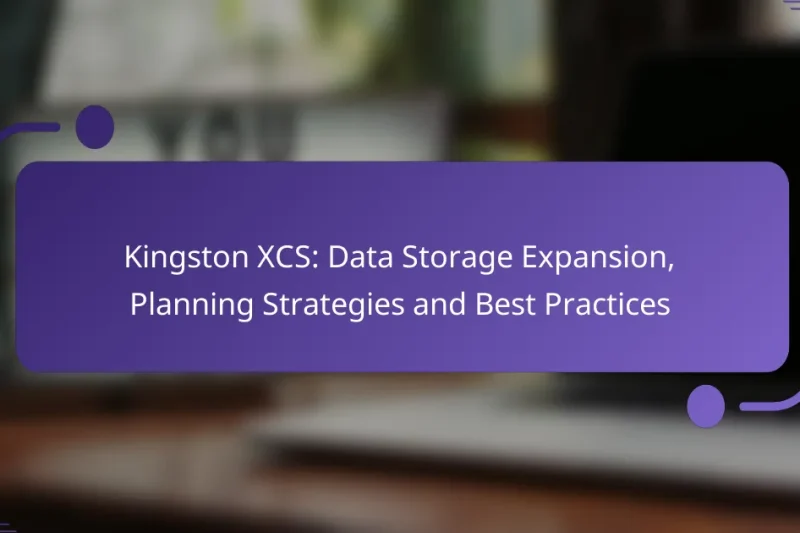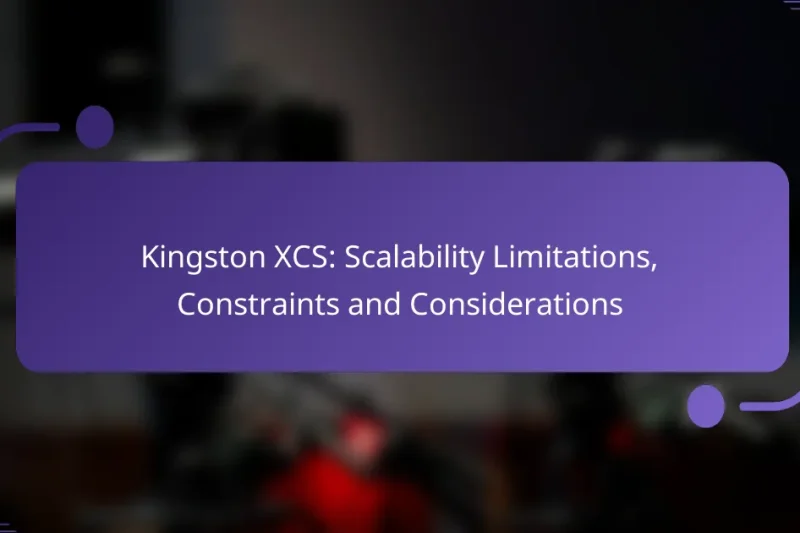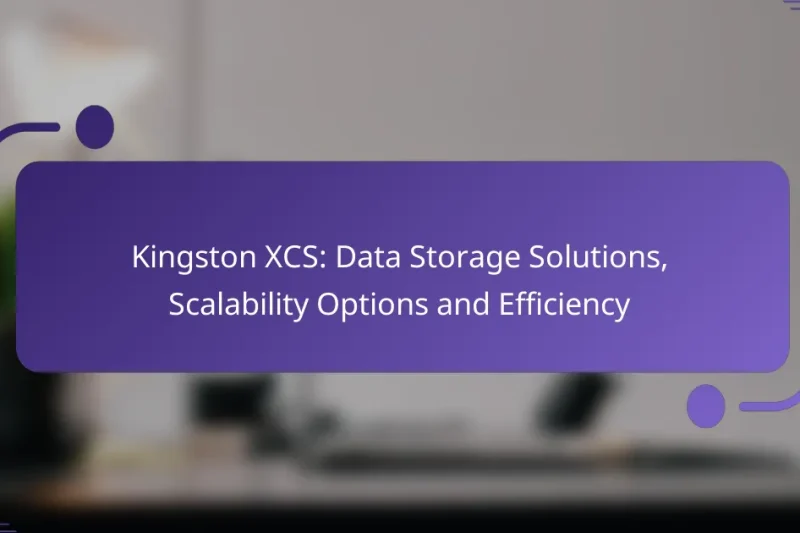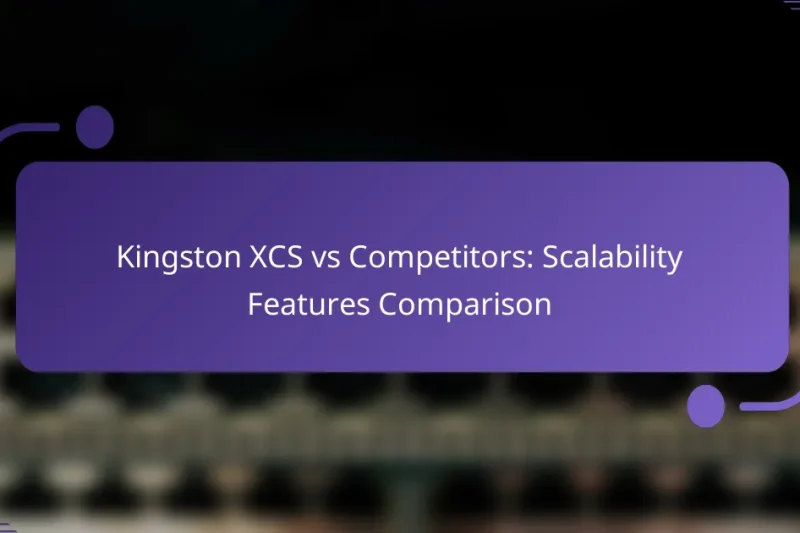Kingston XCS offers robust solutions for data storage expansion, emphasizing the use of Kingston SSDs, RAID … Kingston XCS: Data Storage Expansion, Planning Strategies and Best PracticesRead more
Kingston XCS Data Solutions: Scalability Options
Kingston XCS offers versatile scalability options, including horizontal, vertical, and hybrid scaling, enabling organizations to tailor their data solutions to meet specific demands. With a focus on maintaining data integrity, Kingston XCS employs robust mechanisms to ensure consistency and reliability during the scaling process. Additionally, understanding the cost implications of these scalability options is essential for businesses to make informed decisions regarding their data infrastructure.
Kingston XCS: Scalability Limitations, Constraints and Considerations
The Kingston XCS system is designed to enhance performance and storage capacity, addressing the growing demands … Kingston XCS: Scalability Limitations, Constraints and ConsiderationsRead more
Kingston XCS: Scalability Assessment, Growth Strategies and Business Needs
Kingston XCS is poised to enhance its growth and efficiency through various scalability strategies, including cloud-based … Kingston XCS: Scalability Assessment, Growth Strategies and Business NeedsRead more
Kingston XCS: User Case Studies, Data Solutions and Scalability Success
Kingston XCS has proven its effectiveness across multiple industries, including financial services, healthcare, and retail, by … Kingston XCS: User Case Studies, Data Solutions and Scalability SuccessRead more
Kingston XCS: Budgeting for Growth, Cost Management and Future Planning
Kingston XCS offers innovative tools and strategies that streamline budgeting for growth, enabling organizations to efficiently … Kingston XCS: Budgeting for Growth, Cost Management and Future PlanningRead more
Kingston XCS: Data Storage Solutions, Scalability Options and Efficiency
Kingston XCS offers a diverse range of data storage solutions, including SSDs, USB drives, SD cards, … Kingston XCS: Data Storage Solutions, Scalability Options and EfficiencyRead more
Kingston XCS vs Competitors: Scalability Features Comparison
Kingston XCS stands out in the market with its advanced scalability features, allowing businesses to effectively … Kingston XCS vs Competitors: Scalability Features ComparisonRead more
What scalability options does Kingston XCS offer?
Kingston XCS provides three primary scalability options: horizontal scaling, vertical scaling, and hybrid scaling. Each option allows organizations to expand their data solutions according to their specific needs and workloads.
Horizontal scaling
Horizontal scaling involves adding more nodes or devices to a system to handle increased workloads. This approach is particularly effective for distributed environments, as it can improve performance and reliability without significant downtime.
When considering horizontal scaling, it’s essential to evaluate the network architecture and ensure that the additional nodes can communicate efficiently. For example, a cloud storage solution may benefit from adding multiple servers to distribute data processing tasks.
Vertical scaling
Vertical scaling, also known as “scaling up,” refers to enhancing the capacity of existing hardware by upgrading components like CPU, RAM, or storage. This method can be simpler to implement since it typically requires fewer changes to the existing infrastructure.
However, vertical scaling has its limits, as there is a maximum capacity for each server. Businesses should assess their current hardware capabilities and determine whether upgrades can meet future demands or if they will eventually need to consider horizontal scaling.
Hybrid scaling
Hybrid scaling combines both horizontal and vertical scaling strategies to maximize flexibility and performance. This approach allows organizations to upgrade existing systems while also adding new nodes as needed, creating a more adaptable infrastructure.
Implementing hybrid scaling requires careful planning to ensure that both scaling methods work seamlessly together. Organizations should monitor performance metrics to determine the most effective balance between the two strategies, ensuring they can respond to changing workloads efficiently.
How does Kingston XCS ensure data integrity during scaling?
Kingston XCS maintains data integrity during scaling by implementing robust mechanisms that ensure consistency and reliability across distributed systems. These mechanisms include data replication and adherence to specific consistency models that safeguard against data loss and corruption.
Data replication techniques
Data replication techniques are essential for maintaining data integrity as systems scale. Kingston XCS employs various replication strategies, such as synchronous and asynchronous replication. Synchronous replication ensures that data is written to multiple locations simultaneously, providing real-time consistency, while asynchronous replication allows for a slight delay, which can improve performance but may risk temporary inconsistencies.
When choosing a replication technique, consider the trade-offs between performance and data safety. Synchronous replication is ideal for critical applications where data loss is unacceptable, while asynchronous methods may be suitable for less critical operations where speed is prioritized.
Consistency models
Consistency models define how data is viewed and updated across distributed systems. Kingston XCS utilizes several models, including eventual consistency and strong consistency, to cater to different application needs. Eventual consistency allows for temporary discrepancies between replicas, which can enhance availability and performance, while strong consistency guarantees that all users see the same data at the same time.
Choosing the right consistency model depends on the specific requirements of your application. For instance, applications requiring immediate data accuracy, such as financial transactions, should opt for strong consistency, whereas those that can tolerate slight delays, like social media feeds, may benefit from eventual consistency.
What are the cost implications of Kingston XCS scalability?
The cost implications of Kingston XCS scalability involve both initial investment and ongoing operational expenses. Understanding these costs is crucial for businesses to make informed decisions about their data solutions.
Initial investment costs
Initial investment costs for Kingston XCS scalability can vary significantly based on the scale of deployment and specific configuration needs. Businesses should anticipate expenses related to hardware acquisition, software licensing, and potential infrastructure upgrades.
For example, small to medium-sized enterprises may see initial costs in the low tens of thousands of USD, while larger organizations could face investments in the hundreds of thousands. It is essential to conduct a thorough cost-benefit analysis before committing to a specific configuration.
Operational costs
Operational costs associated with Kingston XCS scalability typically include maintenance, support, and energy consumption. These ongoing expenses can add up, so businesses should budget accordingly to ensure sustainable operations.
On average, operational costs may represent a percentage of the initial investment annually, often ranging from 15% to 25%. Companies should consider factors such as data growth rates and potential scaling needs when estimating these costs to avoid unexpected financial strains.
What industries benefit from Kingston XCS scalability?
Kingston XCS scalability is particularly advantageous for industries that require flexible data management and storage solutions. Key sectors include healthcare, finance, and retail, each with unique demands for data handling and performance.
Healthcare
The healthcare industry benefits significantly from Kingston XCS scalability due to the need for secure and efficient data storage. Hospitals and clinics require systems that can handle vast amounts of patient data while ensuring compliance with regulations like HIPAA in the U.S.
Scalable solutions allow healthcare providers to expand their storage capabilities as patient data grows, ensuring they can maintain performance during peak times. For example, a hospital might need to increase its data capacity by 30-50% during flu season, making scalability essential.
Finance
In the finance sector, Kingston XCS scalability supports the rapid processing of transactions and data analytics. Financial institutions must manage large volumes of sensitive data while adhering to strict regulatory standards such as GDPR in Europe.
Scalable systems enable banks and investment firms to adjust their data storage and processing power based on market conditions. For instance, during high trading volumes, a scalable solution can help maintain low latency and high availability, which are crucial for customer satisfaction.
Retail
The retail industry relies on Kingston XCS scalability to manage inventory data and customer information effectively. Retailers often experience seasonal fluctuations, requiring them to scale their data solutions up or down accordingly.
For example, during holiday sales, a retailer may need to double its data processing capacity to handle increased online traffic. A scalable system allows for this flexibility without significant upfront investment, ensuring that retailers can meet customer demand efficiently.
What are the prerequisites for implementing Kingston XCS scalability?
To implement Kingston XCS scalability effectively, organizations need to ensure they meet specific infrastructure and technical requirements. These prerequisites are essential for optimizing performance and ensuring seamless integration as the system expands.
Infrastructure requirements
Organizations must have a robust infrastructure that can support the increased demands of scalability. This includes sufficient server capacity, network bandwidth, and storage solutions that can handle larger data volumes. A scalable architecture often involves cloud-based solutions or hybrid models that allow for dynamic resource allocation.
Consider investing in high-speed networking equipment and redundant systems to minimize downtime. Regular assessments of your infrastructure can help identify bottlenecks and ensure that your setup can grow alongside your data needs.
Technical expertise
Having the right technical expertise is crucial for implementing Kingston XCS scalability. This includes skilled personnel who understand data management, system architecture, and cloud technologies. Teams should be familiar with the specific tools and software that facilitate scalability within the Kingston XCS framework.
Training existing staff or hiring specialists can significantly enhance your scalability efforts. It is advisable to establish a dedicated team for ongoing maintenance and optimization to prevent common pitfalls associated with system expansion.
How does Kingston XCS compare to competitors in scalability?
Kingston XCS offers competitive scalability options compared to its main rivals, allowing businesses to expand their storage solutions efficiently. Its architecture supports seamless scaling, making it suitable for various workloads and organizational sizes.
Comparison with Dell EMC
When comparing Kingston XCS with Dell EMC, scalability is a key differentiator. Dell EMC provides a robust range of scalable storage solutions, often favored by large enterprises for their extensive features and integration capabilities. However, Kingston XCS can offer more straightforward scaling processes, which can be beneficial for small to medium-sized businesses looking for ease of use and cost-effectiveness.
For instance, while Dell EMC systems may require significant upfront investment and complex configurations, Kingston XCS allows for incremental scaling, enabling organizations to add capacity as needed without extensive reconfiguration. This flexibility can lead to lower total cost of ownership over time.
Comparison with NetApp
NetApp is known for its advanced data management features and scalability, particularly in hybrid cloud environments. While both Kingston XCS and NetApp provide scalable solutions, NetApp’s offerings often come with a steeper learning curve and higher operational costs due to their complexity.
Kingston XCS stands out by offering a more user-friendly interface and simpler management tools, making it easier for teams to scale their storage without extensive training. For organizations that prioritize straightforward scalability and quick deployment, Kingston XCS may be the more appealing option.






